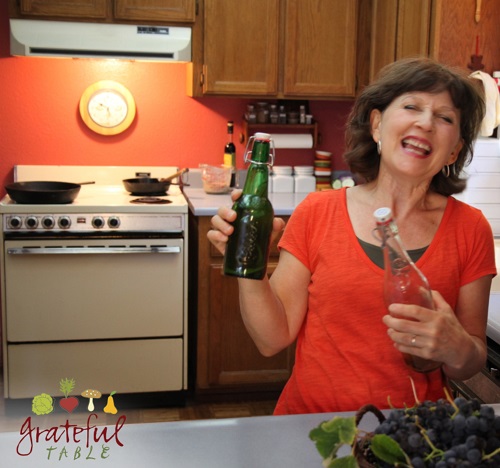 I was going to post on the pros and cons Kombucha vs. Kefir. But that post will have to wait. For now, I don’t even know if this is a pro or con: You won’t get drunk from your Kefir. You can try to ferment it for twice as long, but before you open that bubbly drink, put on your face-mask and helmet.
I was going to post on the pros and cons Kombucha vs. Kefir. But that post will have to wait. For now, I don’t even know if this is a pro or con: You won’t get drunk from your Kefir. You can try to ferment it for twice as long, but before you open that bubbly drink, put on your face-mask and helmet.
Fortunately, my 30-year-old son suffered no damage when experimenting. But he’d tried to up the alcohol content by letting his kefir ferment a full four days. He’d put the brew into an old Grolsch bottle–the kind with a ceramic stopper, rubber ring, and metal straps to hold it on tight. Well, it got quite carbonated; when he went to open it, the entire metal casing shot right off the bottle, like a rocket, along with the ceramic stopper. Seriously, watch out when playing with kefir!
Alas, my son did not get drunk off the brew. But I’m sure his gut was happy.
Meanwhile, I brought some “kefir soda” to my women’s group. I was anticipating squeals of delight as they all began to imagine how they, too, could brew this stuff. (I even brought along some extra grains, in case anyone was so inspired.) Instead, one of my friends decided she could taste the alcohol, and that she was in fact feeling tipsy. She admitted that she’s very sensitive to alcohol, but… really?!
Of course, that encouraged the entire group to suspect that the real reason for my effervescent mood was just the alcohol talking. My pride was a tad wounded. I take this health stuff so seriously!
But I had to be a good sport. It was all in jest. I pretended I was drunk, but put the extra grains back in my bag. No one seemed too eager to take on a new kefir project.
Kelly the Kitchen Kop (see her post here) had the same concerns as me, what with an extended family suspecting she might be turning her kids into boozers. So she went to quite a bit of effort to determine just how much alcohol is in kefir. Her findings: Less than 1%, which concurs with other findings.
Cultures for Health goes into detail, but basically, alcoholic content of normally-brewed water kefir is lower than 1%. They say that all cultured and fermented foods contain a small amount of naturally occurring alcohol, but it is usually significantly less than 1%.
However! If you actually wanted more alcohol in your kefir, you could use 100% juice in the first ferment (along with the sugar), adding the grains right to the juice/sugar mix. (But only go for 24 hours, lest you have an experience like my son had…)
Oh, and if you love the idea of Kefir Beer, this page goes into detail.
I will have to do a home-brewery experiment at some point, if only out of curiosity. I’m considering that I could brew something very strong and alcoholic, and drink it before the next women’s group meeting. Just so we could compare the “really” drunk me with the regular one. But… I probably won’t go that far.

Oh my heavens!!! I surely enjoyed your post. Being a member of The Church Of Jesus Christ of Latter Day Saints, it was especially enjoyable on account that the same senario at our woman’s group would have been crazy funny since we don’t drink at all. ?Ha ha! Just thinking about it makes me laugh. Still I’m so sorry you had to go through that. What a trooper you are and so full of grace. I appreciate your example and your honesty. I would have taken on the kefir project and been delighted that you brought grains, had I been there! I’ve been fermenting my bread with natural start for about five years and have seen great results, but needed something easier and less time consuming for summer. Thank you for your story. It is exactly what I needed to hear. I will sleep better tonight with my water kefir fermenting happily on my counter. ❤️Hugs, Bianca.
Glad you got a kick out of that, Bianka! As it turns out, I researched further and found that even a ripe Apple has some alcohol in it. And now, some of the ladies from that same group are asking me how to make their own kombucha and kefir. Vindicated, Ha!
I had the same experience when I tried to share my milk kefir with my family. We are members of the Church of Jesus Christ of Latter-day Saints too – so we don’t drink alcoholic beverages. My brother said he didn’t “do” fermentation. I tried to tell them that the natural occurring alcohol was negligible -like a piece of ripe fruit – but he still demurred. My sister was more interested and gave it a try. I enjoy my milk kefir shake every morning. Because of holiday parties and treats I didn’t open the shake I made three days ago, until this morning. I did a search this morning for possible alcohol content and found this cute story. My shake has been traveling to work with me and spent time on my desk, in my iced lunch bags and overnighted in the fridge. When I opened the half pint mason jar this morning, determined to get my probiotics today, the kefir foamed over! It probably has a bit more alcohol than usual. It could be considered a second ferment, I guess- since I put in a little homemade fresh cranberry sauce in it and a squirt of stevia. It is quite fizzy. Still yummy! I’m drinking it and I don’t think I will need to confess to my bishop. ; )
Love your story, Sherilyn! Yes, it sounds like you definitely got your probiotics for the day ha ha!
I see prev comments were 2 1/2 yrs ago.
I am researching where goes the alcohol generated by the yeast in kefir & tibicos cultures. The yeasts get a jump on bacteria cultures during fermentation and dominate early on, so how does final alcohol content end up so low?
I have also experienced many other people reporting feeling tipsy or high from tibicos especially. My research indicates its a combination of anticipation due to fermented odors and the body’s physiological response to antioxidants, enzymes, large doses of B vitamins & other nutrients creating positive cravings & endorphin release in response . After diet mods regularly include kefir & tibicos other food cravings (prticularly sugar) disappear.
Interesting! Isn’t it great that cravings for sugar can disappear by adding this drink?
Todd, you will have to keep me posted, if you draw any more conclusions from your research!